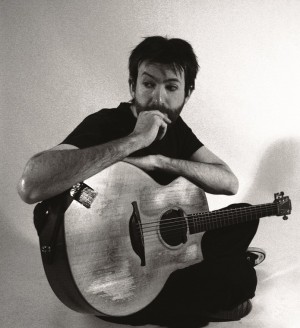One-Man Symphony: Jon Gomm
Who needs iTunes? Jon Gomm, the British virtuoso acoustic guitarist, singer/songwriter, is quite content to put his music up for sale on his own Web site. Not only does he skip over the musical world marketplace of Apple’s iTunes, but also, many of the tracks on his site are available for whatever the customer wants to pay. This can work out to good advantage. One customer, he told me, plunked down $50 for one track, just to show support.
Gomm has forged a playing style that incorporates, not only the strings of the instrument, but also the body, top, and bottom, which he uses to great effect as numerous percussion instruments. While many guitarists may be content to strum and fret the strings, Gomm explores the entire instrument with both hands, creating a kinetic movement and energy (bongos and bass lines) that allow him to display his passion for a particular piece of music.
As unconventional as his playing style might be, he sees himself in the very traditional role of troubadour. In this respect, he has reached his goal as a musician because he can pack up his guitar, get in the car, and drive to the pub to play his music. This is how he makes his living. He also tours extensively in Europe including Germany, Italy, The Netherlands, and Poland. A possible American tour is in the planning stages for next year.
Gomm eschews the mainstream music industry to create his own independent musical kingdom. He points out how the musician of today is able to take his career into his or her own hands including every aspect of writing, recording, distribution, and marketing their music. This brings excitement to his eyes and passion to the stories that he tells.
Gomm’s proficiency with his guitar is evident in blues, rock, country, classical, and flamenco styles. While we spoke, he picked up his guitar to demonstrate certain ideas and riffs. The music literally flows out of the man like a river. Moreover, when he says he has spent his entire life learning, practicing, and studying this instrument, the emotion in his voice is as deep as his soul.
GALO: I’ve read your father was a music critic. What type of music interested him and what kind of influence, if any, did his taste have on you?
Jon Gomm: When I was a kid, my entire musical world was my dad’s record collection. That was the entire universe to me and it was huge. It went from opera to [Frank] Zappa and to quite mainstream pop to really strange jazz — all kinds of stuff. But the music he used to review was blues. And the reason he did it was because there was a local promoter putting on little blues gigs in the town I grew up in, which was called Blackpool. Somebody told me the best way to describe Blackpool is [to compare it to] Coney Island.
GALO: It’s by the ocean.
JG: Yeah, so it has a beach, but also, fair grounds. Like an old-fashioned working class tourist resort whose glory days are long ago. I think that’s the best way to describe it. But there was a promoter there putting on blues gigs; British and American blue’s artists. My dad was trying to help with the promotion, so he wrote reviews of every gig for the newspaper. He used to review blues CDs as well. And it was all about trying to get more people to go to these gigs. [Laughs] Sometimes, I would write the review, when I got a bit older. The first album I ever reviewed was Damn Right, I Got the Blues by Buddy Guy. And, I can remember, I described him as having a voice like, “a vengeful angel.” I was really proud of that line. I think I was about 12. It was about 1990. It was great; I got to go to all of these gigs with my dad, and the musicians would always stay at his house because he had a big house and the promoter didn’t have enough money for the hotel rooms.
My favorite guy to come over was Walter Trout. He was in John Mayall’s Bluesbreakers; the birthing pool of many, many blues rock guitar players — Walter Trout from Los Angeles. He used to come over and teach me so much. I’d get my guitar out the morning after the gig and he’s be drinking his coffee and trying to get awake, and I’d be hustling him to get to show me how he plays certain things. It was great.
GALO: What a nice perk for you.
JG: I was very lucky.
GALO: Where’s Leeds exactly?
JG: It’s in the north of England. It’s a former industrial city. It’s near to Manchester, which you may have heard of. They had a big period with some famous bands: The Stone Roses, The Smiths, and Morrissey.
GALO: And wasn’t Joy Division from Manchester?
JG: Yes, and they were all on the same label called Factory Records. But the coolest band on Factory Records, who were not very famous at all, was called The Durutti Column. Have you ever heard of them?
GALO: I have not.
JG: They were really cool. It was guitar led instrumental music, completely different than anything else that was happening at the time. They’re one of my favorite bands, a Manchester band. But Leeds doesn’t have such a big musical history. The most recent band to come out of Leeds is a band called the Kaiser Chiefs. I know them a little bit. They used to work behind the bar of a music pub.
(Article continued on next page)

